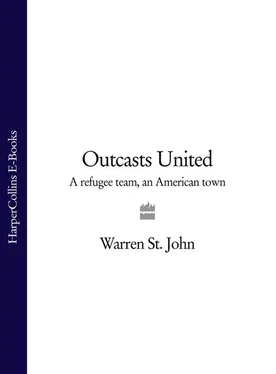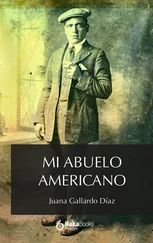“These girls were lazy—incredibly lazy,” she said.
Luma was the notable exception. Though Brown didn’t know much about the Jordanian girl, she noticed her dedication right away and felt she was the kind of player a team could be built around. Coach Brown asked a lot of her players, and especially of Luma. She expected them to be on time to practice, to work hard, to focus, and to improve. She believed in running—lots of running—and drilling to the point of exhaustion. Brown challenged her players by setting an example herself. She was always on time. She was organized. When she asked her players to run five kilometers, she joined them, but with a challenge: “Because you’re younger I expect you to do it better than me,” she told them. “If I beat you, you can expect the worst practices ever.”
“They ran,” Brown said.
Brown’s coaching philosophy was built on the belief that young people craved leadership and structure and at the same time were capable of taking on a tremendous amount of responsibility. She didn’t believe in coddling.
“My feeling is that kids have to have rules,” Brown explained. “They have to know what the boundaries are. And kids want to know what their limits are. It’s important for them to know that people have expectations of them.”
Brown was resigned to the fact that her players might not like her at first. But she took a long view toward their development and their trust in her. She was willing to wait out the hostility until her players broke through.
“I’m stubborn,” Brown said. “I don’t give in a lot. You can come across as mean, and until they see what kind of person you are they might not like you.”
In fact, Luma didn’t like Brown at all. She felt singled out for extra work and didn’t appreciate all the extra running. But she kept her mouth shut and didn’t complain, partly, she said, out of a suspicion that she and her teammates would benefit from the harsh treatment.
“I knew my teammates were lazy—talented but lazy,” Luma said. “And part of me was like, Maybe I want the challenge. Maybe these very harsh, very tough practices will work .”
Over time, the practices began to have an effect. The team improved. They were motivated, and even the slackers on the team began working hard. Along the way, Luma started to pick up on a seeming contradiction. Though she told herself she disliked Coach Brown, she wanted desperately to play well for her. “For the majority of the time she coached me, I hated her,” Luma said. “But she had our respect. She didn’t ask us to do anything she wouldn’t do. Until then I’d always played for me. I’d never played for a coach.”
When Luma was in high school and still playing for Coach Brown, the junior varsity girls’ football team at the American Community School found itself in need of a coach. Luma volunteered. She emulated Brown—putting the team through five days a week of running drills and pushing the young women to work harder and to get better. Luma loved it. She liked the way the daily problems of the world seemed to recede once she took the field, the subtle psychological strategies one had to employ to get the best out of each player, and most of all the sense of satisfaction that came from forging something new out of disparate elements: an entity with its distinct identity, not a collection of individuals, but a new being, a team. And she wasn’t afraid to admit she also liked being in charge.
But as she got older and accustomed to the liberty she had as a woman at ACS—where she could coach and play sport as she pleased—she began to feel at odds with the Jordanian society in which she had grown up. She wanted to be able to play games of football with whoever was around, without regard to gender. She wanted the liberty to be as assertive in her daily life as Coach Brown had taught her to be on the court. Her family’s social status created additional pressure for her to follow a more traditional path. There were obligations, as well as the looming threat that she might be pressured into marrying someone she didn’t love.
“When you come from a family that’s prominent, there are expectations of you,” she said. “And I hated that. It’s a very patriarchal society, and as modern as it is, women are still second-class citizens. I didn’t want to be treated that way.”
Coach Brown picked up on Luma’s yearning. At a team sleepover, the players and coach went around the room predicting where everyone would be in ten years. Coach Brown joked that Luma would be “living illegally in the United States.” Everyone laughed, including Luma. But she disagreed.
“In ten years, I’ll be there legally,” she said.
“I knew from even our brief time together that she wanted something else for her life,” Brown recalled.
Toward the end of Luma’s junior year, she and her parents decided she would attend college in the United States. Hassan and Sawsan wanted their daughter to continue her Western education, a rite of sorts for well-to-do Jordanians. But Luma was more interested in life in the United States than she was in what an education there might do for her in Jordan. “America was the land of opportunity,” she said. “It was a very appealing dream of what you want your life to be like.” Within the family, Luma’s grandmother alone seemed to understand the implications of her going to college in the United States.
“If she moves to America,” Munawar told the family, “there’s a chance she won’t come back.”
Luma’s first trip to the United States came when she enrolled at Hobart and William Smith College, a coed school in the Finger Lakes region of New York, not too far from where her father had gone to college. She played football her first fall there, but midway through the season injured a knee, sidelining her for the rest of the year. Luma liked the school well enough, but winter there was colder than anything she had experienced in Amman, and the campus was remote. She wondered if she had made the right choice in going so far from home. Luma decided to look at other schools, and soon visited Smith College, the women’s school in Northampton, Massachusetts. The campus seemed to perfectly embody the setting Luma had envisioned for herself when she left Jordan for America. It was set in a picturesque New England town with a strong sense of community and security. And as a women’s college, Smith was focused on imbuing its students with the very sort of self-reliance and self-confidence Luma felt she had been deprived of at home. Luma fell in love with the place and transferred for her sophomore year.
At Smith, Luma had what she described as a kind of awakening. She was taken by the presence of so many self-confident, achieving women, and also by the social mobility she saw evident in the student body. Her housemate, for example, was the first in her family to go to college, and there she was at one of the preeminent private colleges in the United States. That would never happen in Jordan , Luma remembered thinking to herself at the time.
Luma’s friends at Smith remember her as outgoing and involved—in intramural football and in social events sponsored by the college’s house system. Few understood her background; she spoke English so well that other students she met assumed she was American.
“One day we were hanging out talking about our childhoods and she said, ‘I’m from Jordan,’” recalled Misty Wyman, a student from Maine who would become Luma’s best friend. “I thought she’d been born to American parents overseas. It had never occurred to me that she was Jordanian.”
On a trip home to Jordan after her junior year at Smith, Luma realized that she could never feel comfortable living there. Jordan, while a modern Middle Eastern state, was not an easy place for a woman used to Western freedoms. Professional opportunities for women were limited. Under Sharia law, which applied to domestic and inheritance matters, the testimony of two women carried the weight of that from a single man. A wife had to obtain permission from her husband simply to apply for a passport. And so-called honor killings were still viewed leniently in Sharia courts. As a member of a well-known family, Luma felt monitored and pressured to follow a prescribed path. A future in Jordan felt limited, lacking suspense, whereas the United States seemed alluringly full of both uncertainty and possibility.
Читать дальше












